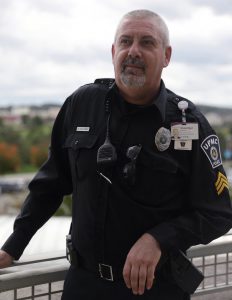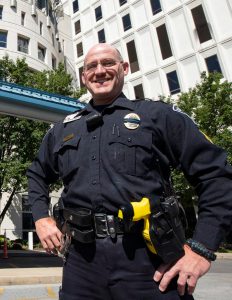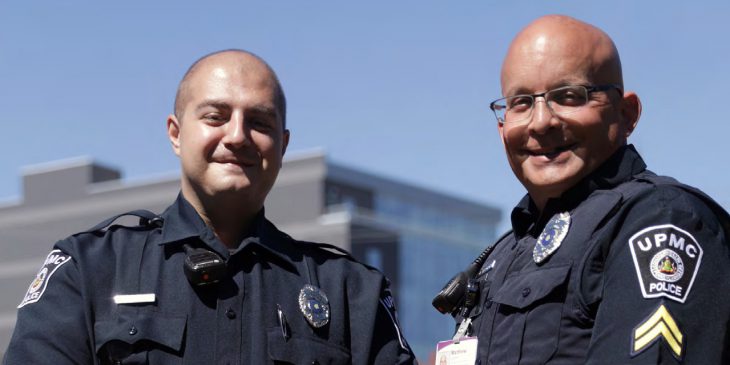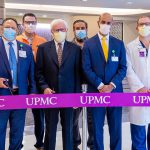In emergency situations, every second counts. When patients experience medical emergencies at UPMC facilities, UPMC police officers are sometimes first to respond. They routinely demonstrate how basic knowledge and training can save lives and improve health care outcomes.
Knowing the Signs
In September 2019, UPMC Passavant senior police officer Gueorgui (George) Valtchev was posted at the hospital’s emergency department entrance as a man approached, pale, sweating and unfocused.

Gueorgui (George) Valtchev
After confirming the patient was experiencing chest pain, Valtchev noticed he was wearing a smart watch, which registered his heart rate at 41 beats per minute. Valtchev recognized this as a sign of a heart attack and alerted the emergency department staff for help.
Valtchev credits his basic knowledge of cardiac arrest and heart attack symptoms for being able to quickly respond. His swift thinking helped staff to rapidly treat and stabilize the patient’s condition.
“In the emergency department, we see the results of first responders in action and often get credit for the immediate life-saving tasks they perform in the field,” explained Dr. Joe Suyama, chief of emergency services, UPMC Magee-Womens Hospital. “Providing emergency medical care doesn’t take an advanced medical degree. It’s about recognizing an emergency and having the will and basic skills to intervene.”
After the man was discharged from UPMC Passavant, he thanked Valtchev for saving his life. Now, over a year later, they stay in touch after bonding over the experience.
Skills to Save Lives
Those trained in emergency intervention skills never know when they will need them.
Last summer at UPMC Magee-Womens Hospital, a woman was waiting outside for her ride home when a fistula — an abnormal connection between two blood vessels — in her arm burst open.
Bleeding profusely, she returned to the lobby, where an unidentified Good Samaritan and UPMC police officers Anthony Costa and Matthew Lisovich (pictured above) sprang to action. Using a tourniquet from Costa’s belt, they were able to immediately stop the bleeding.
Tourniquets have been part of UPMC officers’ standard uniforms for two years.
“One of us started applying direct pressure, one held her arm up and in place, and one applied the tourniquet,” Costa said. “We all talked it through and guided each other throughout the process. As soon as we got the tourniquet on, the bleeding stopped — it was pretty much instant.”
The patient had surgery the following morning. She went home three days later and is currently doing well.
Suyama was part of the team that responded to the incident, and he was impressed at the level of professionalism and knowledge the officers displayed.
“In seconds, our officers assessed the situation and stopped the bleed with the utmost concern for the patient’s care and comfort,” he said.
For Lisovich, the incident underscored how important well-prepared staff and bystanders can be. “It was a team effort. The experience made us proud to be a part of the UPMC team,” he said.
Aid for a Patient in Need at UPMC Altoona
Answering a call to action, like the officers at UPMC Magee, comes naturally to Matthew Diehl, a police corporal at UPMC Altoona.

Matthew Diehl
Last summer, he was dispatched to a parking lot, where he found a woman slouched at the wheel of her car and struggling to remain calm. She thought she was having a heart attack and was unable to control her breathing or feel some of her fingers.
“Nothing is going to happen while I’m by your side,” he told her as he tried to slow her breathing. “Help is on the way.”
Shortly after arriving at the emergency department, the woman recovered and was discharged. Matthew credits his career and ongoing education at UPMC for being able to adequately help the patient – even if she had been in cardiac arrest.
“As an officer, I always told myself that if I help just one person a day, my duties are complete,” he said. “It is always a rewarding feeling knowing that I’m able to help others during their time of need.”








